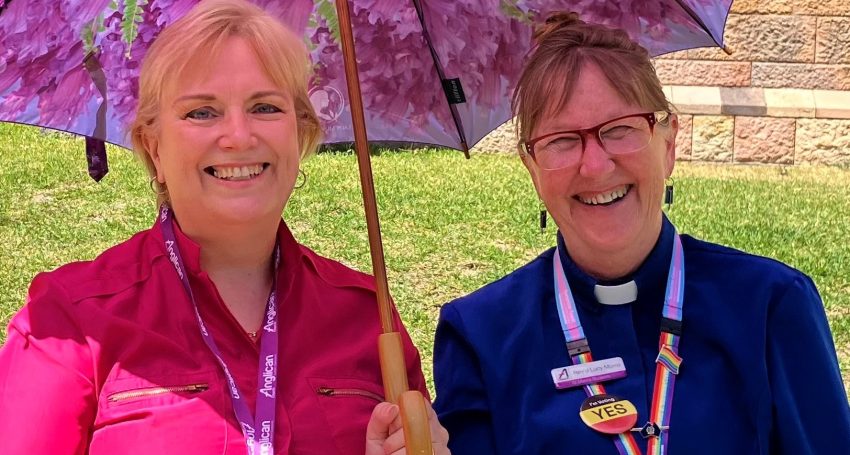Making the invisible visible
Justice & Advocacy
“Domestic and family violence remains a difficult issue for many in the Church. It’s an uncomfortable concept that is incongruous for those who value peace, love and care. And because of this we can develop a blind spot to this issue within our own families, workplaces, social networks, and indeed in our church communities,” says new Domestic and Family Violence Working Group chair The Ven. Dr Lucy Morris

The Ten Commitments for Prevention and Response to Domestic and Family Violence within the Anglican Church of Australia challenge us is so many ways. Commitment 7 is no exception.
The Ten Commitments strategic document, which has been endorsed by the General Synod Standing Committee, starts Commitment 7 with this quote from a survivor:
“My church had great documents but they didn’t follow them.”
Domestic and family violence remains a difficult issue for many in the Church. It’s an uncomfortable concept that is incongruous for those who value peace, love and care. And because of this we can develop a blind spot to this issue within our own families, workplaces, social networks, and indeed in our church communities.
Advertisement
In Australia the National Community Attitudes Towards Violence Against Women Survey (NCAS) is the world’s longest-running population-level survey of community attitudes towards violence against women. The NCAS tells us how people understand violence against women, their attitudes towards it, and if there has been a change over time. The survey also gives us some insight into the level of selective blindness around domestic abuse.
The last published survey results show that a huge majority of the national community believe that violence against women is a problem in Australia — 91 per cent, in fact.
Yet the same survey found that only 47 per cent of respondents believe that violence against women is a problem in their own suburb or town. How can this be?
How is such selective blindness created and what sustains it? How can we create greater visibility? How to we learn more and sit with these uncomfortable subjects and ideas.
Commitment 7 helps us see ways forward:
“Our church uses communication resources effectively and in an ongoing way, to support cultural change and to inform our members that domestic and family violence is honestly faced in the church. We also strengthen the church’s ability to support victims/survivors and ensure that every church member knows where and how they can seek pastoral care and professional help.”
Advertisement
7.1 Each diocese communicates biblical teaching and local policies on domestic and family violence to members of the church through accessible channels, in culturally relevant ways.
7.2 Dioceses and parishes make the prevention of violence an ongoing goal for the church.
7.3 Resources such as videos, posters, case studies are made available to parishes for distribution to church members.
7.4 Parishes are encouraged to use their websites and other tools of communication to inform members and help victims/survivors to know how to seek pastoral care within the church and also how to contact external professional services.
As with many other areas of the Ten Commitments these ideas both challenge and encourage us to do things differently.
Communication is the fuel of change — we preach, converse, email, tweet and podcast. However, we often do these things in the context of a very busy and noisy communication environment. New communication channels offer additional opportunities, but also risk us being overloaded with views that support our current opinions, don’t challenge us with alternative views or don’t encourage us to balance talking, listening and reflecting.
Related Story
 Justice & Advocacy
Justice & Advocacy
Prevention and response to domestic and family violence through the Ten Commitments
The ACSQ Domestic and Family Violence Working Group has achieved much during 2023, including working with a number of key local agencies, such as Anglicare Southern Queensland, local women’s refuges and prison support groups.
We are updating our own training, as well as identifying existing training for both groups and individuals — the free self-paced online Ridley College course is a great example of this.
Between 25 November (the International Day for the Elimination of Violence Against Women) and 10 December (Human Rights Day), the Church will be participating in the 16 Days of Activism Against Gender-Based Violence. Keep an eye on the anglican focus Events page for services and events related to this annual campaign.
We are currently working on a Bible study and preaching tools that are connected to our Lectionary.
Our working group also recently contributed to an Anglicare Southern Queensland submission to a consultation on a Queensland Domestic and Family Violence Perpetrator Strategy.
Much work remains, and perhaps the most challenging commitment is commitment number 7 because we need to change the culture of our Church if women and children are going to be safe in their homes and in their wider family relationships. This is important so all people can flourish.
Note from Domestic and Family Violence Working Group chair The Ven. Dr Lucy Morris: The Anglican Church Southern Queensland (ACSQ) is committed to the rollout of the Ten Commitments as our Church’s response to domestic and family violence. This includes encouraging links with local support services.
The following 24/7 telephone services have a long track record responding to people experiencing domestic and family violence:
- DV Connect 1800 811 811 helps Queenslanders wanting to escape domestic violence.
- 1800RESPECT is a national service providing information, referrals, and counselling.
If you, or the person you are assisting, are in immediate danger please call the Police on 000.
Rob Bates (Director of Professional Standards) note 13/10/2023: The Office of Professional Standards is also available to offer support and guidance and can be contacted on 1800 242 544 or via email professionalstandards@anglicanchurchsq.org.au.





